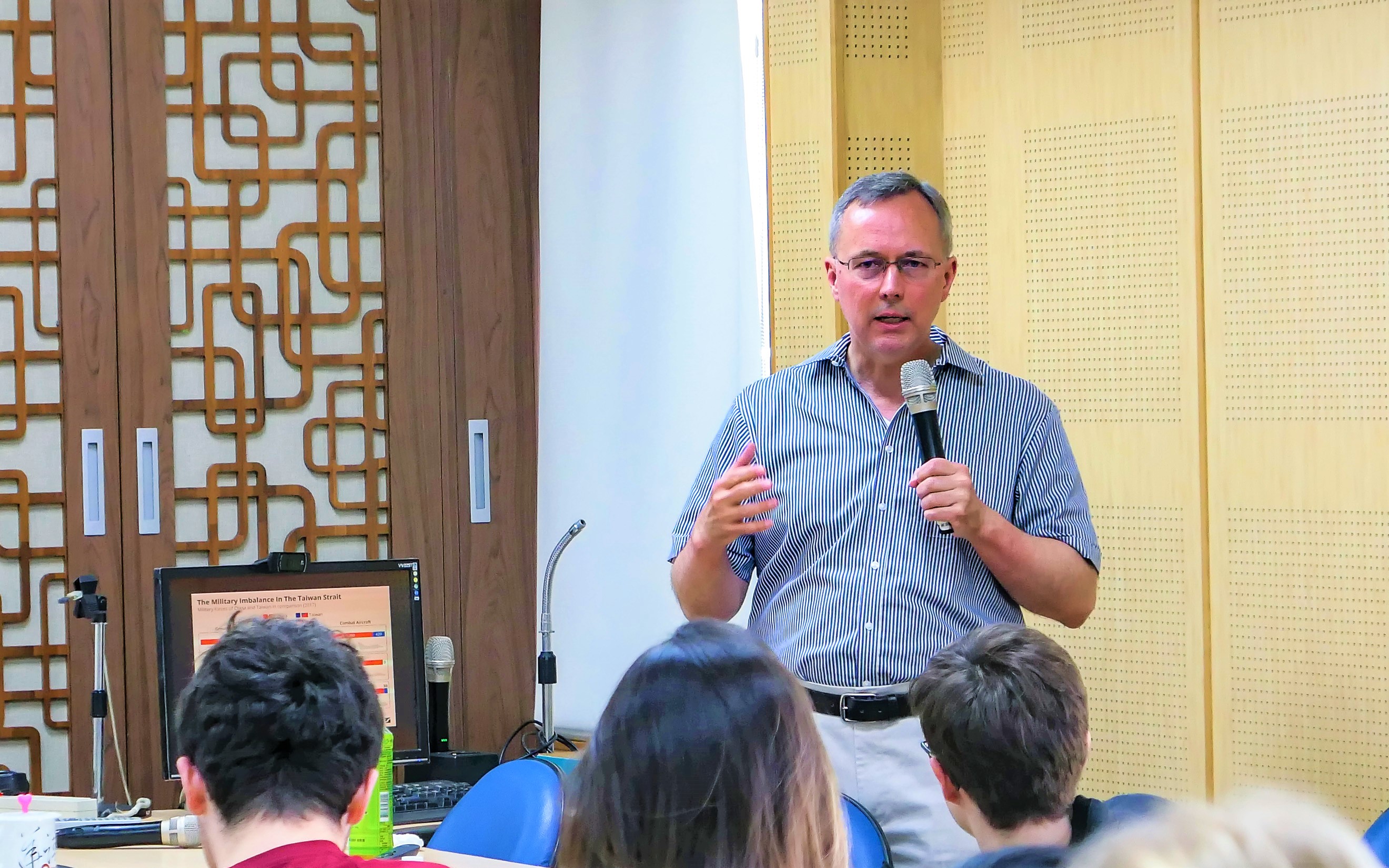
【English below】
本學期初,ICLP學生親身經歷了臺灣大選的奇觀。此次之所以特別為世界所矚目,原因在於這意味著兩岸關係進入了下一階段。由於國民黨初選發生意想不到的情況,有人因此提出對國民黨前途以及中國可能使用操控手段的疑問。
大選前一天,ICLP特別邀請到香港城市大學教授Daniel C. Lynch(林丹)來給師生分享他對中國崛起的停滯與兩岸關係的未來的看法。為了說明該講題的刺激評論,林丹教授以三個因素為導因:經濟放緩、人口轉化與公共衛生。相較於國際社會對日本及蘇聯崛起的敬畏,面對中國的崛起則有所不同,中國被多數人視為不可阻擋、經濟增長永無止境、有望取代美國成為全球霸主的國家。
與1980年代的日本一樣,中國的人口亦快速高齡化,然而有史以來,沒有任何國家在人口增長緩慢的情況下能夠擴大自身的實力。經濟方面如日本的泡沫化,是由於過度依靠債務來促進成長的結果。與蘇聯相比,中國的死亡率亦逐年上升,這起因於環境污染等類似成因。儘管習近平在2013年發誓將再度改革,但如果沒有犧牲經濟增長的意志,衰落就成定局。
面臨如此不可逾越的障礙,中共在25年內吞併臺灣的計畫可能已被摧毀,因為統一臺灣的路徑圖依靠於壓倒性的經濟優勢,進而建立牢不可破的關聯性。林丹教授表示「在臺灣不惜代價取悅中共的利益集團,要想維持變得越來越困難」。
韓國瑜於2018年底當選高雄市長後,對媒體操縱的恐懼情緒更加高漲,延續到今年大選前夕,大家都特別擔心中國所謂的「不實訊息輿論戰」。但是在大選之夜,很快就發現臺灣的遏止假消息的政策有效,由於韓國瑜得票率僅為39%,大選結果使該吞併計劃進一步陷入混亂,因此中共便不能再依靠國民黨作為其合作夥伴。目前國民黨黨內人士已開始討論放棄「九二共識」。
雖然中共的吞併計畫近乎失敗,但是臺灣並不一定會得益。作為一個以鬥爭為基礎的政黨,中共為保持鬥爭動力而必須「針對眾矢之的來動員人民」,如臺灣,不過武裝衝突並不恰當。反過來說,習近平脾氣暴躁,可能會把人民視線從未兌現的承諾轉移到對臺灣的鬥爭。
林丹稱「國際社會經過一段時間之後才會意識到中國的崛起早已停滯,但是總有一天會發覺」,其實全世界已經開始警覺。五到十年前,國際媒體以敬畏的態度看待崛起的中國,反而現在抱著相對輕蔑的態度。新疆再教育營、香港反送中抗爭、以及武漢肺炎之亂使得中國的國際形象加速惡化,從而顯露出過度依賴獨裁政權的危險。
根據林丹教授的了解,我們要等到兩會或今年稍晚才能知道中共如何應付臺灣大選後的局勢,但同樣重要的是,全球大國都與臺灣維持非正式關係,並顯示臺灣還有迴旋的餘地。
Early this quarter, ICLP students had the opportunity to experience firsthand the spectacle of a Taiwanese presidential election. While worth observing every four years, this cycle in particular garnered close attention as a bellwether of the next phase in cross-strait relations, with the historically China-friendly Chinese Nationalist Party (KMT) uncharacteristically fronting controversial Han Kuo-yu to challenge President Tsai Ing-wen.
A day before the election on January 10, Professor Daniel C. Lynch of the City University of Hong Kong visited ICLP to share his thoughts on the end of China’s rise and its implications for Taiwan, and after Tsai’s re-election provided a few additional insights with the ICLP e-Newsletter.
The provocative nature of the presentation’s title was not left unexplored, as Lynch outlined three sectors supporting his assertion that China has come to the end of its dramatic rise: the economy, demographics, and public health. With the same awe that accompanied Japan and the Soviet Union’s seemingly limitless ascension, many are viewing China as a similarly unstoppable giant poised to overtake the United States as global hegemon, even as it encounters the same challenges that led to its two neighbors’ downfall.
As in 1980s Japan, China has a rapidly aging population and shrinking workforce, leaving it with the herculean task of becoming the first nation to ever boost its relative power with slow population growth. Contrary to expectations for a developing country, the death rate is also rising, likely due to pollution and other factors that also plagued the Soviet Union. Significantly, China is also relying on debt to inflate economic growth, with banks freely lending to state-owned enterprises as the government remains hostile toward private business. Even though Chinese President Xi Jinping during a 2013 Chinese Communist Party (CCP) work conference on the economy vowed to resume reform, without the political will to sacrifice the growth rate or enact more drastic measures, the writing is already on the wall.
Faced with these insurmountable challenges, the CCP’s 25-year plan to annex Taiwan through economic dependence has likely been left in ruins. Without strong incentives or resources, it is becoming more difficult to “maintain a constellation of interest groups determined to appease the CCP at all costs.”
January’s electoral outcome threw this plan into further disarray as Han garnered only 39% of the vote, a particularly disappointing result considering China’s massive disinformation campaign. After proving instrumental to Han’s 2018 mayoral victory in Kaohsiung and taking front stage in the campaign, fears abounded that a new era of disinformation was dawning in Taiwanese politics. In the end, media literacy efforts won out, leaving the CCP flummoxed and without its familiar KMT crutch to lean on. Indeed, there is now talk within the KMT about abandoning the “1992 consensus,” China’s basis for cross-strait dialogue and its justification for freezing ties under Tsai. Even the concept of the Republic of China — the KMT’s nostalgic glue, as evidenced by the sea of red and blue flags during election rallies — will be thrown into question, as it “relies on China’s rise for legitimization.”
Even though the annexation plan is failing, Taiwan will not necessarily benefit. As a party founded on struggle, the CCP must “keep the population mobilized by redirecting toward a struggle,” such as against Taiwan, providing incentive to preserve confrontation without armed conflict. On the other hand, military action is not out of the question, as Xi has “an explosive temper and might want to divert attention away from his unfulfilled promises.”
“It will take the world a while to realize that the rise has stalled, but it will happen,” and is indeed already happening. There is a kind of contempt in the media that was rare five or 10 years ago when the world viewed China’s rise with respectful awe. The Xinjiang camps, Hong Kong protests, and now COVID-19 are accelerating the deterioration of China’s image and exposing the dangers of economic and political reliance on an authoritarian system. China will undoubtedly remain a global power, but will likely be expected to conform to international standards going forward.
In Lynch’s opinion, we will likely not know the CCP’s updated strategy on Taiwan until this year’s postponed National People’s Congress or later in the summer, pending the KMT’s decision on the “1992 consensus.” However, with Taiwan standing on more precarious ground than ever, it is also important to remember that all the major global powers (minus China) maintain unofficial ties, showing that Taiwan is not as isolated as it may seem.
© ICLP-NTU. ALL RIGHTS RESERVED.